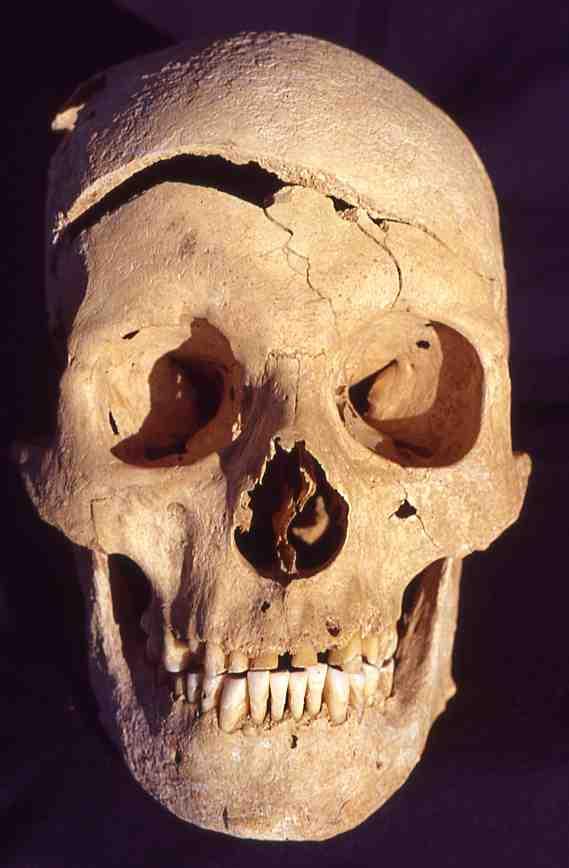Press Releases Archive
08.11.2018
The Dark Ages were relatively healthy
“Backbone of Europe” bioarchaeological survey on 2000 years of populations shows how health suffers when inequality rises
The early medieval period, from the 5th to the 10th centuries, is often called the Dark Ages. But in the age of legendary heroes such as Siegfried and King Arthur, even the middle and lower classes were healthier than their descendants in later centuries – even as late as the 19th-century industrial age. That is the conclusion reached by a team of economists, archaeologists and anthropologists who have collected data on human health in Europe over 2000 years in an unprecedented bioarchaeological survey. Their results have been published in a new book, “The Backbone of Europe - Health, Diet, Work and Violence over Two Millennia.”
Professor Jörg Baten, economic historian at the University of Tübingen, worked with Richard H. Steckel and Clark Spencer Larsen of Ohio State University and Charlotte A. Roberts from the University of Durham and numerous others to compile a vast database across a broad cross-section of European countries. To obtain an overall understanding of the history and development of human health, violence and division of labor, Baten and a team of 75 anthropologists and bioarchaeologists spent a decade examining more than 15,000 human skeletons. The remains were drawn from more than 100 different locations across Europe, and had been buried between the third century BCE and the mid-nineteenth century. The basic question was - what impact did climate and geography, as well as socio-economic developments, have on human health?
The researchers looked at the health of the individuals’ teeth, at their stature, and evaluated various other factors concerning the quality of their diet and the apparent physical burden of their work. The researchers counted violently broken skulls and compared them with Europeans who died more peacefully. The overall data led to some surprising conclusions. For instance, it revealed that the 6th-century Plague of Justinian had indirect positive effects on the health of the population. The generations born immediately after the plague had access to a greater selection of resources, which meant better living conditions for all. Perhaps most surprisingly, the researchers found that from that point on, health overall steadily deteriorated for a long period - from the early Middle Ages to the era of industrialization. Baten and his team say this is explained by increasing population density, rising social inequality, and the Little Ice Age from the 16th to the 19th centuries.
The researchers add that the activity of states in Europe from the 15th century onward had an effect in countering the trend of poor health in the population. Government helped to increase security, which led to less violence in European societies. The study’s unique approach also enabled comparisons with comparable research conducted in the Americas. Richard H. Steckel found a similar correlation between greater social organization and higher thresholds for violence in his studies comparing pre-Colombian Mexican civilizations with the warlike tribes of North America.
The “Backbone of Europe” study helps us to better understand how economic, climate, and social change affect human health - and reinforces the imperative to learn from history.
Professor Jörg Baten heads the project B06 “Humans and Resources in the Migration Period and the Early Middle Ages. Anthropological and Bioarchaeological Analyses of the Use of Food Resources and the Detection of Migrations” jointly with Professor Jörn Staecker and Professor Joachim Wahl. It is part of the collaborative research center 1070 ResourceCultures at the University of Tübingen.
Publication:
“The Backbone of Europe - Health, Diet, Work and Violence over Two Millennia.” Richard H. Steckel, Clark Spencer Larsen, Charlotte A. Roberts, Joerg Baten (eds.). Cambridge University Press 2018
Contact:
Professor Dr. Jörg Baten
University of Tübingen
Business and Economics
joerg.baten@uni-tuebingen.de
Phone: +49 7071 29-78167
Contact for press:
Eberhard Karls Universität Tübingen
Public Relations Department
Dr. Karl Guido Rijkhoek
Director
Antje Karbe
Press Officer
Phone +49 7071 29-76789
Fax +49 7071 29-5566
antje.karbe@uni-tuebingen.de
www.uni-tuebingen.de/en/university/news-and-publications.html

